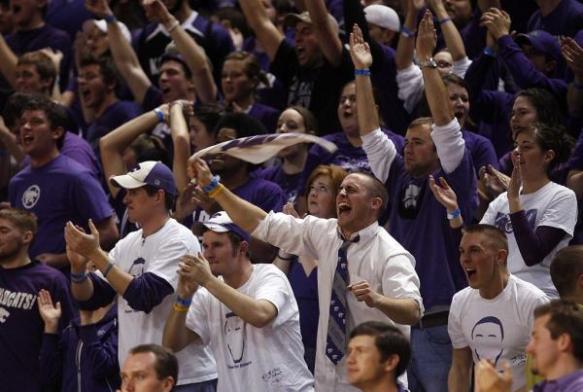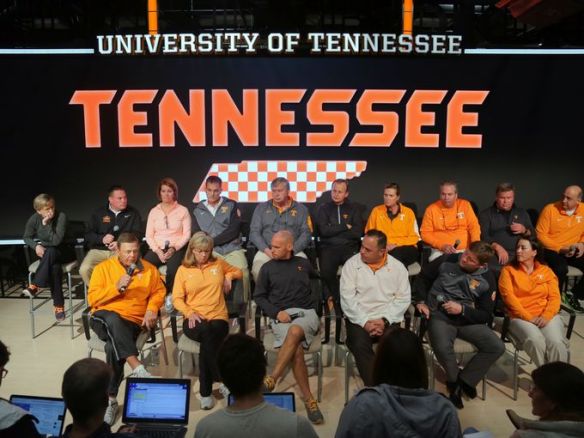
(Photo by Ann Williamson/The Topeka Capital-Journal)
Universities have the challenge of constantly being in the risk management business, while trying to promote the education and advancement of its students. In the past week we saw two universities with communication missteps. Kansas State University (K-State) tried to further remind its students how it thinks they should behave at sporting events. The University of Tennessee (UT) attempted to showcase its positive athletic department culture despite being in the midst of a federal lawsuit charging them with a hostile sexual environment.
Both instances involve collegiate athletics; something that inherently stirs passion from fans, students, alumni, and those from opposing schools.
 (Photo by Randy Sartin/USAToday Sports)
(Photo by Randy Sartin/USAToday Sports)
Quick Backgrounds:
K-State: Required students to sign a sportsmanship pledge at the start of the current school year. They followed this up by banning* the fan-favorite song, Sandstorm at basketball games, due to profane chants that had been heard when playing their in-state rival. Prior to their most recent home-game against the same in-state rival, K-State issued a video, again reminding its students how to act.
UT: All 16 of its varsity coaches held a press-conference without the athletic director (who was out of town) or school president to reassure player (and more directly current and future recruits) that despite current federal lawsuit accusing the school of a hostile sexual environment, that everything is fine.
Why these were missteps:
K-State: There is certainly merit in K-State trying to establish what they deem as good sportsmanship behavior. But:
- A “sponsorship pledge” and then repeated reminders of “you better be good” is incredibly juvenile. The additional “taking your song away if some of you can’t play nice” and a reminder video before the game were repeated reminders of “we don’t trust you.”
- If you want a target audience to change their behavior, treat them as adults, instead of cranky 5-year-olds. Or else, they’ll act just like those cranky 5-year-olds and do the opposite of what you want them to do.
- As it relates to your in-state rival, realize that not everyone is going to extend open and welcoming arms to them at their home games. Just imagine if they tried this at Auburn and Alabama. There are always a few bad apples…when that happens, don’t pretend it’s the whole bunch.
UT: The coaches may have had the right idea of trying to get in front of the story and insert their own narrative into the current message. But:
- It wasn’t until later in the news conference when the head football coach –whose players were at the center of some of these allegations – finally addressed who matters most by saying, “Our hearts, our thoughts and our prayers go to out to the alleged victims.”
- These comments should have been at the start of the news conference to express empathy. Your target audience doesn’t care what you know until they know that you care. All 16 coaches should have focused less on how great their culture is and how they have a renewed focus on protecting their student athletes and all students at the University.
- They lauded the “culture” of the university and departments as the best it’s been, cohesive and united, despite charges that the university “enabled a culture that led to sexual assaults and then administrators influenced the handling of discipline by accused athletes.”
- While not addressing the lawsuit may have been expected, saying everything is fine when it clearly isn’t causes your audience to roll their eyes in disbelief instead of nodding their heads in agreement with your message.
What they should have done:
K-State: Crafted an open letter to fans at the start of the year by the athletic director welcoming them to the school year, while including these “sportsmanship” parameters about what makes the students and its fans great.
UT: Never held the press conference. Now we’re talking about their misguided message which is the exact opposite of what the coaches hoped to accomplish with their “press conference.”
With these improvements, the schools’ brands can hit the mark instead of seeming misguided.
